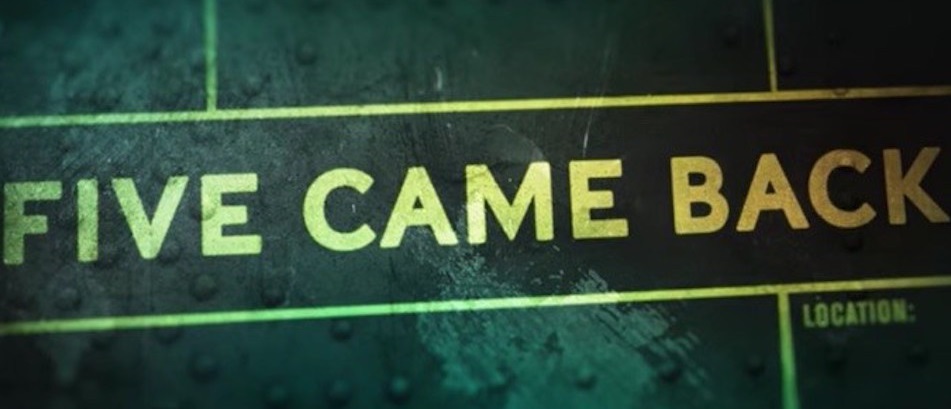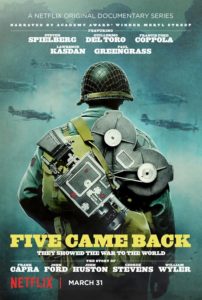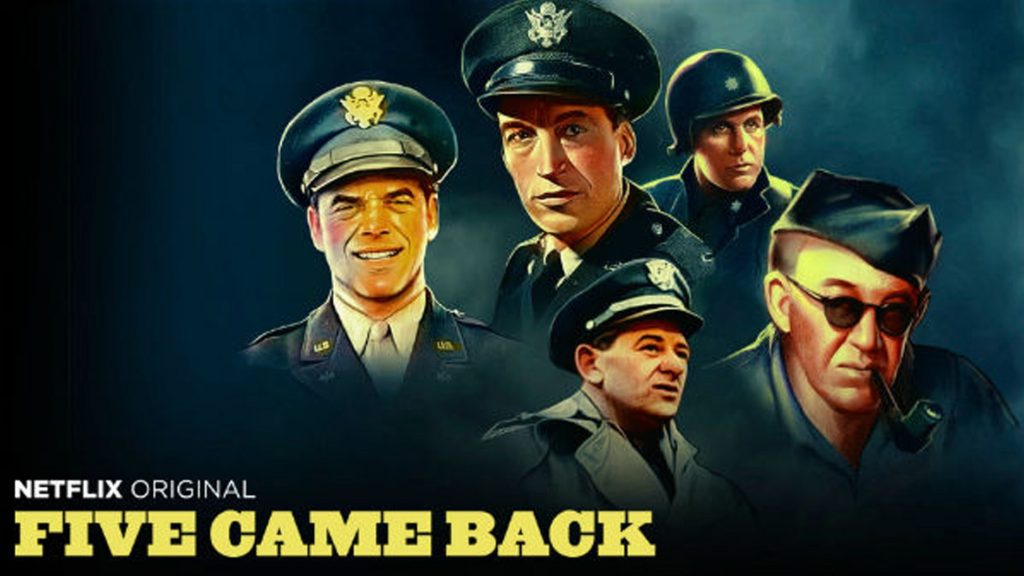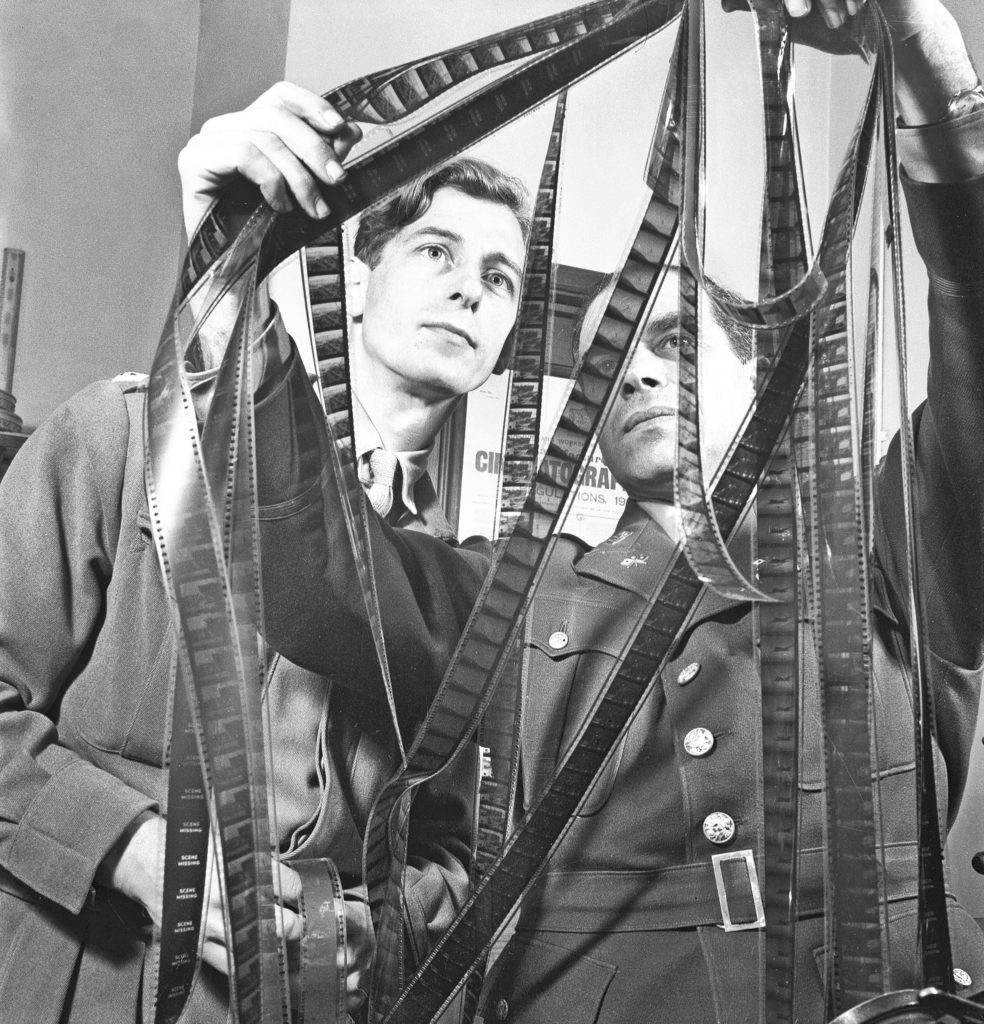
Five Came Back
Director: Laurent Bouzereau
Starring: Meryl Streep, Steven Spielberg, Guillermo del Toro
Writer: Mark Harris
A review by Michael Walls-Kelly

What is the best way to help a cause that you truly believe in? Is it following orders and doing what you’re told, or being proactive and using your passions and talents in a way that few others could?
Five Came Back is a new three-episode docu-series produced by Netflix based on the book of the same name by Mark Harris. The “five” in the title are filmmakers who supported the World War II war effort by using their singular gifts for propaganda, education, documentation, and even criminal evidence. The men involved — Frank Capra, John Ford, John Huston, George Stevens, and William Wyler — were Hollywood greats who knew that their specific talents could be used for a greater cause when their country needed it the most.
The first episode is “The Mission Begins” where we learn a little bit about who these men are and why they joined the fight. We also get present day filmmakers discussing them, each one taking on a specific member of “the five” but also giving their takes on the broader scope of things. Steven Spielberg talks about Wyler, Guillermo del Toro about Capra, Francis Ford Coppola about Huston, Lawrence Kasdan about Stevens, and Paul Greengrass about Ford. It was a good choice because it keeps the narrative from getting repetitive while intercutting between these men’s stories. It’s also just really nice to see some of my favourite filmmakers speak passionately about their own personal heroes.
“The Mission Begins” also sets up what we can expect from the series visually and stylistically. If there were no other positives to this series (there are tons though) it would be worth it as a compilation of beautiful, awe-inspiring footage from that time period. Just seeing outtakes from Huston’s The Battle of San Pietro or Ford’s The Battle of Midway is worth the time alone. But the entire production weaves a narrative of these men and their inspiration and sense of duty, helped along by the present-day filmmakers giving us more insight and Meryl Streep’s narration which is helpful without being overbearing.
The second episode is “Combat Zones”, which shows the efforts of the five while the war rages on with the United States an active and integral part. There are some really interesting and effective pieces of this episode dealing with racism. They discuss how the Japanese population was practically dehumanized in the eyes of the American population, and some of that blame falls on the films that were made at that time. It’s a very interesting concept and a documentary solely focused on that would be incredibly interesting, unfortunately Five Came Back has to short-change certain ideas like that in order to keep its own focus.

“The Price of Victory” wraps up the last experiences these filmmakers had during the war and how their lives were forever changed by it. Each one gets a fitting, and moving, send-off. As a huge fan of Capra, I was particularly moved by the reverence shown for his work. I also ended up gaining a much deeper, richer respect for the other filmmakers than I thought I could have. Huston’s movie about the mental effects of war on soldiers returning home, Let There Be Light, wasn’t even allowed to be screened until 1981. Wyler made the incredible, and incredibly personal, The Best Years of Our Lives which dealt with the difficulties of soldiers returning to their normal lives. Stevens, who I maybe gained the greatest respect for after watching this series, was so changed by recording and being present at the liberation of Dachau that he was never able to make a comedy again. Instead he gave us stunning, powerful films like Giant, Shane, and The Diary of Anne Frank. Ford, one of the earliest filmmakers to see the importance of movies during the war effort, continued making wonderful films like The Searchers and — most importantly, in my eyes — gave the asshole John Wayne as much shit as he could for not enlisting.
Five Came Back discusses the importance of cinema in a number of ways. The powerful way Hitler used Leni Riefenstahl’s propaganda to spread his views, the documentation of the heroes and horrors of the war, and a way in which these filmmakers can help during the war and try to heal afterwards. Without the experiences these men had during the war we wouldn’t have some of the greatest films of all time, movies which were made to try to make some sense of what man can do, both great and awful.

The Verdict
Watch it! If you have any interest in these particular directors, Hollywood history in general, the war effort, or just watching some great filmmakers talk about their idols’ works, then this is the series for you. It obviously doesn’t go into as much detail as Harris’s fantastic book, but the added bonus of the film footage makes it a great companion piece. The series has a general overview of cinema’s importance during World War II but remains focused on the five men, sometimes to its detriment. The most gripping episode of the three is “Combat Zones” which expands the focus a bit to talk about racism and segregation while also showing some of the best footage shot during the war. All three episodes are great though, with “The Price of Victory” being a wonderful and touching wrap-up to the series.
I’d also suggest checking out the book by Mark Harris if you enjoyed the series. Even without seeing the movies being discussed it’s an engrossing read and goes into even more details about the five filmmakers. Netflix also has a list of some of the films mentioned in Five Came Back that are available on their service, which I can’t recommend enough.


